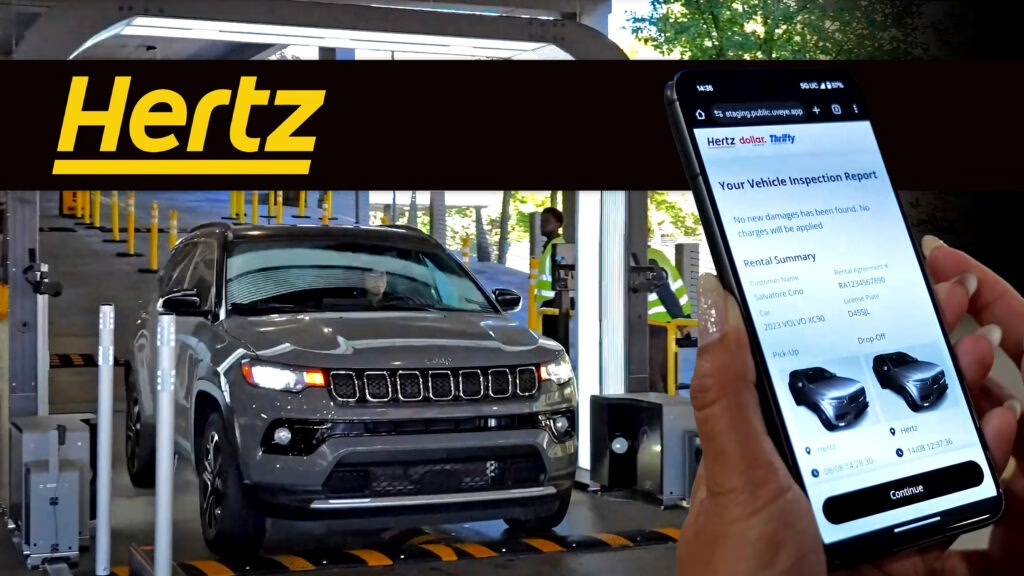Transforming Vehicle Inspections: The Future of Car Rentals at Hertz
The car rental experience is about to undergo a significant transformation, particularly for travelers in the United States. Hertz, a prominent player in the rental car industry, is partnering with Israeli tech startup UVeye to implement advanced AI-driven vehicle inspection systems at major airport locations. This initiative, which begins at Hartsfield-Jackson Atlanta International Airport, promises to enhance the efficiency and accuracy of vehicle inspections, fundamentally changing how customers interact with rental cars.
Enhancing Efficiency with AI Technology
Hertz’s decision to adopt UVeye’s technology marks a pivotal shift from traditional manual inspections to a more streamlined, automated process. The UVeye scanners utilize sophisticated cameras and sensors to conduct thorough inspections of vehicles in mere seconds. This innovation aims to cut costs, reduce unnoticed damage, and improve fleet maintenance, ultimately benefiting both the company and its customers.
The scanners, often referred to as the “MRI for vehicles,” are designed to detect a wide range of mechanical and cosmetic issues. They meticulously examine the bodywork, glass, underbody, and tires, providing a comprehensive assessment of the vehicle’s condition. The data collected is then compared to the vehicle’s original condition report, allowing for precise identification of any changes that may have occurred during the rental period.
The Implications for Customers
While the primary goal of this technology is to enhance operational efficiency, it also raises questions about transparency and customer accountability. Hertz emphasizes that the system will improve the accuracy and frequency of vehicle maintenance, but it may also lead to customers being held responsible for damages that might have gone unnoticed in previous inspections. This is particularly relevant at airport locations where thorough checks were not always guaranteed.
For travelers, this means that minor scratches or dents—previously overlooked—could now be flagged by the AI systems, potentially resulting in unexpected charges. As the technology becomes more prevalent, customers may find themselves navigating a landscape where every imperfection is documented and scrutinized. This shift could lead to a more cautious approach to vehicle handling, as renters become increasingly aware of the potential financial implications of minor damages.
A Step Towards Greater Transparency
Hertz’s initiative is not just about improving efficiency; it’s also about fostering transparency in the rental process. Once a vehicle is returned, customers will receive a detailed inspection report directly on their smartphones. This digital documentation eliminates the need for manual photo-taking during pick-up, ensuring that both parties have a clear understanding of the vehicle’s condition before and after the rental.
Moreover, UVeye’s technology includes a tire treadwear system that alerts staff when tires need replacement, identifying uneven wear and potential defects. This proactive approach to vehicle maintenance not only enhances safety but also contributes to the longevity of the fleet.
The Broader Impact on the Rental Industry
Hertz’s implementation of AI-driven scanning technology is likely to set a precedent within the rental car industry. Other major companies, such as Enterprise and Avis, are closely observing this development and may consider adopting similar systems in the near future. As the industry evolves, the integration of advanced technologies will become increasingly crucial for maintaining competitiveness and meeting customer expectations.
The financial implications of this shift are significant as well. Hertz, which has faced challenges in recent years—including a reported $2.9 billion loss in 2024—sees this technology as a means to improve efficiency and potentially generate additional revenue. By ensuring that all vehicle damages are accurately recorded and accounted for, the company can better protect its assets and enhance its bottom line.
Navigating the Future of Car Rentals
As Hertz rolls out over 100 UVeye systems across its major airport locations by the end of the year, customers will need to adapt to this new reality. While the technology promises to streamline the rental process and improve vehicle maintenance, it also introduces a layer of scrutiny that may feel invasive to some travelers.
The balance between efficiency and customer experience will be critical as Hertz navigates this transition. Will the benefits of faster inspections and improved transparency outweigh the potential for increased costs due to minor damages? Only time will tell, but one thing is certain: the future of car rentals is changing, and technology is at the forefront of this evolution.
In conclusion, as the car rental industry embraces AI and automation, customers should stay informed and prepared for the implications of these advancements. Understanding how these systems work and their potential impact on rental agreements will be essential for a smooth and satisfactory rental experience.

